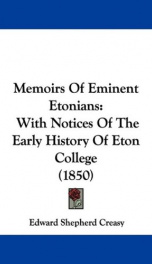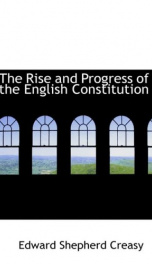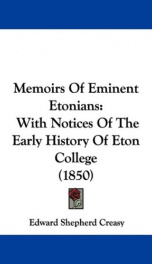memoirs of eminent etonians

Purchase of this book includes free trial access to www.million-books.com where you can read more than a million books for free. This is an OCR edition with typos. Excerpt from book: abandoned the project. But the virtues of Henry the Sixth are his best canonisation, nor need he have a fairer shrine than the College which his own piety founded, and which his own bounty endowed. Having thus sketched the history of the foundation of Eton, and of our Founder, I proceed to the separate consideration of the eminent Etonians of the fifteenth century, and foremost of these stands, our first actual Provost: WILLIAM OF WAYNFLETE. The father of this distinguished statesman, divine, and scholar seems to have sometimes borne the surname of Patten, sometimes that of Barbour. Indeed surnames among the mass of the population were at that period used with little fixity or regularity. William the son was known, at least after the period of his taking holy orders, by the designation of William of Waynflete. The old chronicler, Holinshed, says" It was a fashion in those days from a learned spiritual! man to take awaie the father's surname (were it never so worshipful or ancient) and give him for it the name of the town he was born in." He cites several instances of this, and states " that it in like manner happened to William Waynflete, is a matter right proveable." Waynflete was educated at Winchester and Oxford, and he seems to have entered into holy orders in the year 1420. His age at this time may be guessed at, but the precise year of his birth is uncertain. In 1429, he was appointed Head-Master of Winchester, and for many years Waynflete discharged his duties there ably, diligently and successfully, when King Henry the Sixth became acquainted with him and resolved to make him the chief of his Eton College. Waynflete thus became an intimate favourite with King Henry; and to his honour be it recorded, that he was true to his royal patron in his adversity as we...
Info about the book
Author:
Series:
Unknown
ISBN:
1117236528
Rating:
5/5 (2)Your rating:
0/5
Languge:
English
Users who have this book
Users who want this book
What readers are saying
What do you think? Write your own comment on this book!
write a commentif you like memoirs of eminent etonians try:
Do you want to exchange books? It’s EASY!
Get registered and find other users who want to give their favourite books to good hands!





